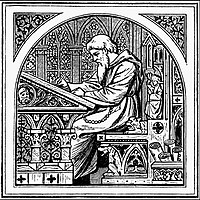Welcome to the writing portal
Introduction

Writing is the act of creating a persistent representation of human language. A writing system uses a set of symbols and rules to encode aspects of spoken language, such as its lexicon and syntax. However, written language may take on characteristics distinct from those of any spoken language.
Writing is a cognitive and social activity involving neuropsychological and physical processes. The outcome of this activity, also called "writing", and sometimes a "text", is a series of physically inscribed, mechanically transferred, or digitally represented symbols. The interpreter or activator of a text is called a "reader".
In general, writing systems do not constitute languages in and of themselves, but rather a means of encoding language such that it can be read by others across time and space. While not all languages use a writing system, those that do can complement and extend the capacities of spoken language by creating durable forms of language that can be transmitted across space (e.g. written correspondence) and stored over time (e.g. libraries or other public records). Writing can also have knowledge-transforming effects, since it allows humans to externalize their thinking in forms that are easier to reflect on, elaborate on, reconsider, and revise. (Full article...)
Selected article
Screenwriting is the art and craft of writing scripts for feature films, television productions or video games. It is a freelance profession. The act of screenwriting takes many forms across the entertainment industry. Often, multiple writers work on the same script at different stages of development with different tasks. Over the course of a successful career, a screenwriter might be hired to write in a wide variety of roles. (Full article...)
Selected picture

Selected biography
Andrew Robinson was educated at the Dragon School, Eton College where he was a King's Scholar, University College, Oxford where he read Chemistry and finally the School of Oriental and African Studies in London. He is the son of Neville Robinson, an Oxford physicist. He is based in London and is currently a full-time writer.
Robinson has written several books about the history of writing, including:
- The Story of Writing: Alphabets, Hieroglyphs and Pictograms. Thames and Hudson (2000). ISBN 0-500-28156-4.[4]
- Lost Languages: The Enigma of the World's Great Undeciphered Scripts. McGraw-Hill (2002). ISBN 0-07-135743-2.[5][6]
- Writing and Script. Oxford University Press (2009). ISBN 9780199567782.[3][7][8] (Full article...)
Did you know...
Categories

Writing • Calligraphy • Penmanship • Writing implements • Inks • Alphabetic writing systems • Abjad • Abugida • Kanji • Logographic writing systems • Writing systems • Cyrillic alphabets • Hellenic scripts • Script typefaces
Major topics
• Calligraphy •
Western calligraphy • Islamic calligraphy • Indian calligraphy • Chinese calligraphy • Korean calligraphy • Japanese calligraphy • Persian calligraphy • Manuscript
• Writing instruments •
Pen • Ink brushes • Inks • Ink stone • Qalam • Quill • Dip pen • Nib • Paper • Writing slate • Pencil • Typewriter • Word processor • Dry erase marker • Touchscreen
Things you can do
 | Here are some tasks awaiting attention:
|
WikiProjects
Related portals
Associated Wikimedia
The following Wikimedia Foundation sister projects provide more on this subject:
- Commons
Free media repository - Wikibooks
Free textbooks and manuals - Wikidata
Free knowledge base - Wikinews
Free-content news - Wikiquote
Collection of quotations - Wikisource
Free-content library - Wikispecies
Directory of species - Wikiversity
Free learning tools - Wikivoyage
Free travel guide - Wiktionary
Dictionary and thesaurus












